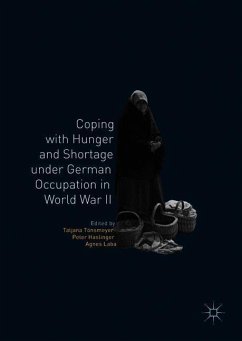Coping with Hunger and Shortage under German Occupation in World War II
Herausgegeben:Tönsmeyer, Tatjana; Haslinger, Peter; Laba, Agnes
Coping with Hunger and Shortage under German Occupation in World War II
Herausgegeben:Tönsmeyer, Tatjana; Haslinger, Peter; Laba, Agnes
- Gebundenes Buch
- Merkliste
- Auf die Merkliste
- Bewerten Bewerten
- Teilen
- Produkt teilen
- Produkterinnerung
- Produkterinnerung
This volume demonstrates how German expansion in the Second World War II led to shortages, of food and other necessities including medicine, for the occupied populations, causing many to die from severe hunger or starvation. While the various chapters look at a range of topics, the main focus is on the experiences of ordinary people under occupation; their everyday life, and how this quickly became dominated by the search for supplies and different strategies to fight scarcity. The book discusses various such strategies for surviving increasingly catastrophic circumstances, ranging from how…mehr
Andere Kunden interessierten sich auch für
![Coping with Hunger and Shortage under German Occupation in World War II Coping with Hunger and Shortage under German Occupation in World War II]() Coping with Hunger and Shortage under German Occupation in World War II95,99 €
Coping with Hunger and Shortage under German Occupation in World War II95,99 €![Exhibiting the Nazi Past Exhibiting the Nazi Past]() Chloe PaverExhibiting the Nazi Past66,99 €
Chloe PaverExhibiting the Nazi Past66,99 €![Exhibiting the Nazi Past Exhibiting the Nazi Past]() Chloe PaverExhibiting the Nazi Past66,99 €
Chloe PaverExhibiting the Nazi Past66,99 €![The Scientific World of Karl-Friedrich Bonhoeffer The Scientific World of Karl-Friedrich Bonhoeffer]() Kathleen L. HousleyThe Scientific World of Karl-Friedrich Bonhoeffer74,99 €
Kathleen L. HousleyThe Scientific World of Karl-Friedrich Bonhoeffer74,99 €![The Scientific World of Karl-Friedrich Bonhoeffer The Scientific World of Karl-Friedrich Bonhoeffer]() Kathleen L. HousleyThe Scientific World of Karl-Friedrich Bonhoeffer74,99 €
Kathleen L. HousleyThe Scientific World of Karl-Friedrich Bonhoeffer74,99 €![The Diary Keepers The Diary Keepers]() Nina SiegalThe Diary Keepers11,99 €
Nina SiegalThe Diary Keepers11,99 €![The Diary Keepers The Diary Keepers]() Nina SiegalThe Diary Keepers14,99 €
Nina SiegalThe Diary Keepers14,99 €-
-
-
This volume demonstrates how German expansion in the Second World War II led to shortages, of food and other necessities including medicine, for the occupied populations, causing many to die from severe hunger or starvation. While the various chapters look at a range of topics, the main focus is on the experiences of ordinary people under occupation; their everyday life, and how this quickly became dominated by the search for supplies and different strategies to fight scarcity. The book discusses various such strategies for surviving increasingly catastrophic circumstances, ranging from how people dealt with rationing systems, to the use of substitute products and recycling, barter, black-marketeering and smuggling, and even survival prostitution. In addressing examples from Norway to Greece and from France to Russia, this volume offers the first pan-European perspective on the history of shortage, malnutrition and hunger resulting from the war, occupation, and aggressive German exploitation policies.
Produktdetails
- Produktdetails
- Verlag: Palgrave Macmillan / Springer International Publishing / Springer, Berlin
- Artikelnr. des Verlages: 978-3-319-77466-4
- 1st ed. 2018
- Seitenzahl: 340
- Erscheinungstermin: 11. Juli 2018
- Englisch
- Abmessung: 216mm x 153mm x 23mm
- Gewicht: 574g
- ISBN-13: 9783319774664
- ISBN-10: 3319774662
- Artikelnr.: 50904756
- Verlag: Palgrave Macmillan / Springer International Publishing / Springer, Berlin
- Artikelnr. des Verlages: 978-3-319-77466-4
- 1st ed. 2018
- Seitenzahl: 340
- Erscheinungstermin: 11. Juli 2018
- Englisch
- Abmessung: 216mm x 153mm x 23mm
- Gewicht: 574g
- ISBN-13: 9783319774664
- ISBN-10: 3319774662
- Artikelnr.: 50904756
Tatjana Tönsmeyer is Chair of Modern History at the University of Wuppertal, Germany. From 2012-2016 she was Head of the 'Europe' Research Area at the Institute for Advanced Study in the Humanities. She co-edits the international research and editorial project 'Societies under German Occupation: Experiences and Everyday Life in World War II'. Peter Haslinger is Director of the Herder Institute for Historical Research on East Central Europe in Marburg, Germany. He is Chair in East Central European History at Justus-Liebig-University Giessen and the Giessen Centre for Eastern European Studies. He is also co-editor of 'Societies under German Occupation: Experiences and Everyday Life in World War II'. Agnes Laba is Post-Doctoral Researcher at the Department of Modern History of the University of Wuppertal. She received her PhD in contemporary history at the University of Giessen for her research on the discourse about the Eastern border of the Weimar Republic.
Introduction: Supply Situations: Nazi Policies of Exploitation and Economies of Shortage of Occupied Societies during World War II; Tatjana Tönsmeyer.- Part I: Economies of Scarcity and "Ersatz" Site.- Black market in the General Government 1939-1945: Survival strategy or (un)official economy?; Jerzy Kochanowski.- Economies of Scarcity in Belarusian Villages During the Second World War. How New Findings from Oral History Projects put a Perpetrator Centered Historiography in Perspective; Tatsiana Kasataya and Aliaksandr Smalianchuk.- Supplies under pressure. Survival in a fully rationed society: Experiences, cases and innovation in rural and urban regions in occupied Norway; Guri Hjeltnes.- "The Black market is a crime against community": the failure of the Vichy Government to create an egalitarian distribution and the growth of the black market in France during the German Occupation (1940-1944); Fabrice Grenard.- The black market in occupied Italy and the approach of Italian and German authorities: 1943 - 45; Alessandro Salvador and Jacopo Calussi.- Bones of Contention: The Nazi Recycling Project in Germany and France during the Second World War; Heike Weber and Chad Denton.- Part II: Coping Strategies and Creating Privileges.- Between employer and self-organisation: Belgian workers and miners coping with food shortages under German occupation (1940-44); Dirk Luyten.- "Dem tschechischen Arbeiter das Fressen geben". Factory canteens in the "Protectorate of Bohemia and Moravia"; Jaromír Balcar.- "With the hope of a piece of sausage or a mug of beer" - Writing a History of Survival Sex in Occupied Europe; Maren Röger.- Part III: Vulnerabilities: At the Bottom of the Supply Pyramid.- Famine in Occupied Greece. On the Particular Role of the Elderly and the Infirm in a Starving Society; Violetta Hionidou.- Food, Money and Barter in the Lvov Ghetto, Eastern Galicia; Natalia Aleksiun.- The North Caucasus and German Exploitation Policies in World War II: Everyday Life Experience of Children during the Occupation; Irina Rebrova and Elena Strekalova.- '...have not received any deliveries of potatoes for quite some time...'. Food supply and acquisition in the ghettos of Vilnius and Kaunas; Joachim Tauber.- Fighting Vulnerability: Child-feeding Initiatives during the Dutch Hunger Winter; Ingrid de Zwarte.- Index
Introduction: Supply Situations: Nazi Policies of Exploitation and Economies of Shortage of Occupied Societies during World War II; Tatjana Tönsmeyer.- Part I: Economies of Scarcity and “Ersatz” Site.- Black market in the General Government 1939-1945: Survival strategy or (un)official economy?; Jerzy Kochanowski.- Economies of Scarcity in Belarusian Villages During the Second World War. How New Findings from Oral History Projects put a Perpetrator Centered Historiography in Perspective; Tatsiana Kasataya and Aliaksandr Smalianchuk.- Supplies under pressure. Survival in a fully rationed society: Experiences, cases and innovation in rural and urban regions in occupied Norway; Guri Hjeltnes.- “The Black market is a crime against community”: the failure of the Vichy Government to create an egalitarian distribution and the growth of the black market in France during the German Occupation (1940-1944); Fabrice Grenard.- The black market in occupied Italy and the approach of Italian and German authorities: 1943 – 45; Alessandro Salvador and Jacopo Calussi.- Bones of Contention: The Nazi Recycling Project in Germany and France during the Second World War; Heike Weber and Chad Denton.- Part II: Coping Strategies and Creating Privileges.- Between employer and self-organisation: Belgian workers and miners coping with food shortages under German occupation (1940-44); Dirk Luyten.- “Dem tschechischen Arbeiter das Fressen geben”. Factory canteens in the “Protectorate of Bohemia and Moravia”; Jaromír Balcar.- “With the hope of a piece of sausage or a mug of beer” – Writing a History of Survival Sex in Occupied Europe; Maren Röger.- Part III: Vulnerabilities: At the Bottom of the Supply Pyramid.- Famine in Occupied Greece. On the Particular Role of the Elderly and the Infirm in a Starving Society; Violetta Hionidou.- Food, Money and Barter in the Lvov Ghetto, Eastern Galicia; Natalia Aleksiun.- The North Caucasus and German Exploitation Policies in World War II: Everyday Life Experience of Children during the Occupation; Irina Rebrova and Elena Strekalova.- ‘…have not received any deliveries of potatoes for quite some time…’. Food supply and acquisition in the ghettos of Vilnius and Kaunas; Joachim Tauber.- Fighting Vulnerability: Child-feeding Initiatives during the Dutch Hunger Winter; Ingrid de Zwarte.- Index
Introduction: Supply Situations: Nazi Policies of Exploitation and Economies of Shortage of Occupied Societies during World War II; Tatjana Tönsmeyer.- Part I: Economies of Scarcity and "Ersatz" Site.- Black market in the General Government 1939-1945: Survival strategy or (un)official economy?; Jerzy Kochanowski.- Economies of Scarcity in Belarusian Villages During the Second World War. How New Findings from Oral History Projects put a Perpetrator Centered Historiography in Perspective; Tatsiana Kasataya and Aliaksandr Smalianchuk.- Supplies under pressure. Survival in a fully rationed society: Experiences, cases and innovation in rural and urban regions in occupied Norway; Guri Hjeltnes.- "The Black market is a crime against community": the failure of the Vichy Government to create an egalitarian distribution and the growth of the black market in France during the German Occupation (1940-1944); Fabrice Grenard.- The black market in occupied Italy and the approach of Italian and German authorities: 1943 - 45; Alessandro Salvador and Jacopo Calussi.- Bones of Contention: The Nazi Recycling Project in Germany and France during the Second World War; Heike Weber and Chad Denton.- Part II: Coping Strategies and Creating Privileges.- Between employer and self-organisation: Belgian workers and miners coping with food shortages under German occupation (1940-44); Dirk Luyten.- "Dem tschechischen Arbeiter das Fressen geben". Factory canteens in the "Protectorate of Bohemia and Moravia"; Jaromír Balcar.- "With the hope of a piece of sausage or a mug of beer" - Writing a History of Survival Sex in Occupied Europe; Maren Röger.- Part III: Vulnerabilities: At the Bottom of the Supply Pyramid.- Famine in Occupied Greece. On the Particular Role of the Elderly and the Infirm in a Starving Society; Violetta Hionidou.- Food, Money and Barter in the Lvov Ghetto, Eastern Galicia; Natalia Aleksiun.- The North Caucasus and German Exploitation Policies in World War II: Everyday Life Experience of Children during the Occupation; Irina Rebrova and Elena Strekalova.- '...have not received any deliveries of potatoes for quite some time...'. Food supply and acquisition in the ghettos of Vilnius and Kaunas; Joachim Tauber.- Fighting Vulnerability: Child-feeding Initiatives during the Dutch Hunger Winter; Ingrid de Zwarte.- Index
Introduction: Supply Situations: Nazi Policies of Exploitation and Economies of Shortage of Occupied Societies during World War II; Tatjana Tönsmeyer.- Part I: Economies of Scarcity and “Ersatz” Site.- Black market in the General Government 1939-1945: Survival strategy or (un)official economy?; Jerzy Kochanowski.- Economies of Scarcity in Belarusian Villages During the Second World War. How New Findings from Oral History Projects put a Perpetrator Centered Historiography in Perspective; Tatsiana Kasataya and Aliaksandr Smalianchuk.- Supplies under pressure. Survival in a fully rationed society: Experiences, cases and innovation in rural and urban regions in occupied Norway; Guri Hjeltnes.- “The Black market is a crime against community”: the failure of the Vichy Government to create an egalitarian distribution and the growth of the black market in France during the German Occupation (1940-1944); Fabrice Grenard.- The black market in occupied Italy and the approach of Italian and German authorities: 1943 – 45; Alessandro Salvador and Jacopo Calussi.- Bones of Contention: The Nazi Recycling Project in Germany and France during the Second World War; Heike Weber and Chad Denton.- Part II: Coping Strategies and Creating Privileges.- Between employer and self-organisation: Belgian workers and miners coping with food shortages under German occupation (1940-44); Dirk Luyten.- “Dem tschechischen Arbeiter das Fressen geben”. Factory canteens in the “Protectorate of Bohemia and Moravia”; Jaromír Balcar.- “With the hope of a piece of sausage or a mug of beer” – Writing a History of Survival Sex in Occupied Europe; Maren Röger.- Part III: Vulnerabilities: At the Bottom of the Supply Pyramid.- Famine in Occupied Greece. On the Particular Role of the Elderly and the Infirm in a Starving Society; Violetta Hionidou.- Food, Money and Barter in the Lvov Ghetto, Eastern Galicia; Natalia Aleksiun.- The North Caucasus and German Exploitation Policies in World War II: Everyday Life Experience of Children during the Occupation; Irina Rebrova and Elena Strekalova.- ‘…have not received any deliveries of potatoes for quite some time…’. Food supply and acquisition in the ghettos of Vilnius and Kaunas; Joachim Tauber.- Fighting Vulnerability: Child-feeding Initiatives during the Dutch Hunger Winter; Ingrid de Zwarte.- Index







